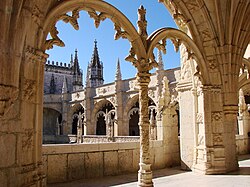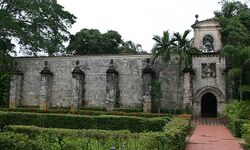Great Monastery of Ro'ekha: Difference between revisions
mNo edit summary |
mNo edit summary |
||
| Line 73: | Line 73: | ||
| rooms = <!-- or | unit_count = --> | | rooms = <!-- or | unit_count = --> | ||
}} | }} | ||
The '''Great Monastery of Ro'ekha''' is a monastery complex of the [[Siresian Order]] on the banks of the Osia southeast of [[Ro'ekha]]. Founded in the 370s, it was the home of a large {{wp|monasticism|monastic}} community which in the 630s and 640s was reformed by its abbot, Sirrezh (Saint Siresius), who founded the Siresian Order. Little remains of the original monastery structures, as further buildings were added to the complex over the following centuries as the order expanded. The entire complex is now a designated [[ARCHO]] heritage site as well as a national Site of Significant Cultural Importance. | The '''Great Monastery of Ro'ekha''' is a monastery complex of the [[Siresian Order]] on the banks of the Osia southeast of [[Ro'ekha]]. Founded in the 370s, it was the home of a large {{wp|monasticism|monastic}} community which in the 630s and 640s was reformed by its abbot, Sirrezh (Saint Siresius), who founded the Siresian Order. Little remains of the original monastery structures, as further buildings were added to the complex over the following centuries as the order expanded. The entire complex is now a designated [[ARCHO]] heritage site as well as a national Site of Significant Cultural Importance. | ||
Revision as of 04:03, 16 April 2020
| Great Monastery of Ro'ekha | |
|---|---|
Monasturë Sereg ti'Rohakha | |
 View from the 16th century Cloisters | |
| General information | |
| Architectural style | Romanesque, Cadenzan Gothic |
| Town or city | Ro'ekha |
| Country | Cadenza |
| Current tenants | Siresian Order |
| Completed | 375 |
| Designations | Site of Significant Cultural Importance ARCHO heritage site |
The Great Monastery of Ro'ekha is a monastery complex of the Siresian Order on the banks of the Osia southeast of Ro'ekha. Founded in the 370s, it was the home of a large monastic community which in the 630s and 640s was reformed by its abbot, Sirrezh (Saint Siresius), who founded the Siresian Order. Little remains of the original monastery structures, as further buildings were added to the complex over the following centuries as the order expanded. The entire complex is now a designated ARCHO heritage site as well as a national Site of Significant Cultural Importance.
The Great Monastery is the mother house of the Siresian Order, whose international presence exceeds four thousand monks globally. There are currently roughly ninety monks resident in the Great Monastery; at its height the monastic community consisted of an estimated four hundred.

The oldest fully intact building is the house of the Knights of Saint Misrav, the Siresians' militant wing founded in the early 1000s. Initially housed with the monks, their numbers quickly swelled large enough that they required their own building. Issues arose in acquiring stone from Lema, however, which delayed completion until 1075, during which time temporary structures were erected on the monastery's grounds.
The monastery chapel, dedicated to Saint Laurence (Deker Lorezhis), was substantially rebuilt in the 12th century and redecorated in the early 16th century, at the same time as a new main church was erected in the Cadenzan Gothic style. This style synthesised the architecture of a number of west Astyrian cultures and that which had evolved in Hesperidesia; it symbolised the maritime and mercantile success of the growing Cadenzan overseas empire. The ornate and lavish architecture of the new structures was funded jointly by the Siresian Order, the Prince-Bishop of Ro'ekha and the republican government of Cadenza.